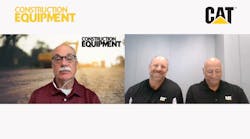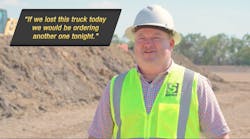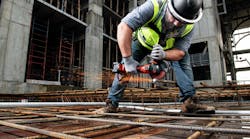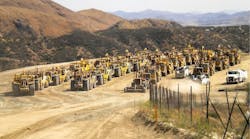(Edited by Loren Faulkner)
Despite an ever-changing economy, equipment leasing might provide a simple solution to grow your business. Think: Fair Market Value Lease, Dollar Buy Out Lease and Commercial Leasing.
Capital is key in order to operate a successful business, especially when the economy is as fickle as it is today. The heavier your cash flow, the greater amount of growth your company will experience. This is especially relevant in the construction industry. For all types of construction, the goal is to complete projects in accordance with plans and specifications, on time, within budget, and at the lowest possible cost. A construction company's success and failure could very well depend on adding a fourth crane to your garage.
Equipment is the single largest investment for a contractor, with costs running from $15,000 to more than $100,000 depending on the model and quantity. There is a solution to cut equipment costs and reduce overhead by way of equipment leasing.
According to the recently released Equipment Leasing and Finance Association's 2007 Annual Equipment Finance Report, construction companies and trucks/trailers were deemed the biggest winners as far as benefits reaped from leasing equipment. In one year, construction leasing grew almost 2 percent, maintaining its No. 3 placement in the $6-billion equipment leasing industry.
Through certain equipment leasing plans, a contractor is able to select from leasing options that allow the company to trade in equipment for the latest upgrades. This is ideal in the construction business, where there are frequent advancements made to equipment requiring contractors to constantly update in order to stay competitive.
As the owner of a new roller compactor and lowboy tractor, John Souza, owner of Souza Custom Homes in Sacramento, understands the benefits of leasing new equipment. "Once you understand how leasing works, the pros are obvious. The tax benefits are great because the depreciation allows for a write-off."
Souza's company specializes in custom homes and excavating in the Bay area. After doing some research, Souza leased new equipment from a San Diego-based equipment leasing firm. "I was pre-approved, and the process was swift and easy. It was extremely important to me to be able to hang on to my capital."
How It WorksThe leasing company (the lessor) contracts the construction company (the lessee) to lease the equipment and pay for it monthly over a fixed time frame of typically two to five years. The lessee will sign the contract for the type of lease that caters to their financial capabilities. The lease can also depend on whether the lessee wants to own the equipment at the end of the lease term or "return" the equipment to obtain a more up-to-date replacement.
All business owners, small and large, can be lessees. Leasing companies secure the funds from the bank. More often than not, lessees are already pre-approved.
The leasing company, if it's a good one, will handle all the paperwork, make sure everything is completed and coordinate with the equipment vendor. It is also the leasing company's responsibility to ensure that payment and delivery are in sync with the schedule of the construction company, and to conduct any customer service needs.
Companies can lease everything from a single bulldozer to 10 concrete mixers. The business owner has a non-cancelable obligation to pay the lease fees and maintenance costs relating to the equipment during the lease term. The lessee also bears the costs of equipment damages and insurance.
Most leasing companies allow a business owner to choose any equipment from any vendor they desire and directly negotiate the purchase price. By closing the deal and assigning the purchase order to the lessor, the new owner has nothing to worry about. The lessor then signs the lease and pays the vendor directly.
Equipment leasing companies are able to help a construction company access financing quickly by using non-collateralized debt. Leasing firms have a unique relationship with financial institutions. This allows for a painless process that quickly establishes the credit ability of the construction business owner with no financials required in leases under $100,000. Equipment leasing has benefited thousands of businesses and helped many construction business owners like Souza run a successful and profitable business with no headaches.
Three Types of LeasesSeveral types of leases are available depending on the financial qualifications of the business owner. The Fair Market Value Lease is best for business owners expecting a decrease in the value of their leased equipment and offers three different end-of-lease options: purchase the leased equipment at fair market value, renew the equipment lease or return the equipment.
The Dollar Buy Out Lease is good for a business looking to purchase and keep the equipment on the completion of their lease. With this option, at the end of the lease term, a business owner may "buy" the equipment for just $1.
For larger equipment purchased over $100,000, Commercial Leases may be best. With this option, many banks will include equipment leases on a business' available credit and reduce the credit line limits accordingly. Some equipment leasing companies, however, have special arrangements so that equipment leases won't affect a company's available bank credit.
As the Equipment Leasing and Finance Association's 2007 Annual Equipment Finance Report numbers show, equipment leasing has helped both small and larger construction companies not only stay afloat but also grow within the current volatile economic conditions. In times like these, it is essential to have ample capital available.
Souza remarked, "After taxes, it is all about the cash flow."
(Editor's Note: Dave Gilbert and Dan Feder are co-CEOs of San Diego-based equipment leasing firm Five Point Capital.)



